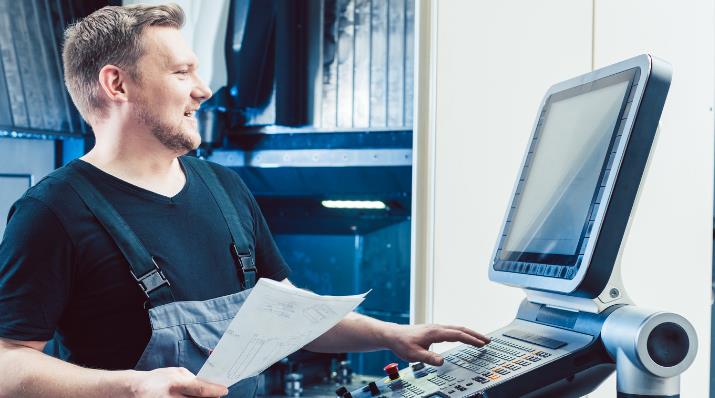CNC (Computer Numerical Control) machinists have a very important role in several fields, such as the manufacturing industry and machinery operations that cut shapes and mold all metals or plastics in specific parts.
Even though there are so many jobs available in basic industries, these parts are needed for several industries like automotive, aerospace, and medical devices. The chances and opportunities in this field are very wide. If you want to know more about the CNC machinist job description and the qualifications for it, read the blog.
What Does a CNC Machinist Do?
The Computer Numerical Control machinist mainly maintains the CNC machines by operating and setting them up properly. The machines do tasks like cutting, drilling, and even sharpening materials by using computer programming. The operator has to keep the machine working smoothly by producing parts that meet precise specifications. The machine works like connecting or setting tools, loading raw materials on the machine, and running and inspecting quality are all included in this work.
CNC Educational Qualification
If you want to start a career as a CNC operator, do education smartly. Mostly, the job role asks for a high school diploma or GED at the beginning. Besides this, there are certain specific courses and specialized machine training in technical schools and vocational programs for CNC machining. These programs will help you improve in machine operation and reading blueprints. The larger organizations seek certifications from recognized organizations. Others can enter the job by doing apprenticeships or internships to gain more experience.
CNC Machinist Skills and Qualifications
As a CNC operator, everyone should. Being a CNC operator requires a combination of technical skills and hands-on experience. Key qualifications include:
- Mechanical Aptitude: The machinist should know how all the machines work and what are the problems that may affect the machine. The operator should also be aware of how to troubleshoot issues.
- Attention to Detail: The very accurate and precise operations are very important in this job. So the machinist should be very attentive to all the things in machining.
- Math Skills: Operators should be good at numbers. They have to do basic math, which also includes geometry and trigonometry at a medium level.
- Computer Skills: CNC is all about programming software. So, the CNC operator should be familiar with CNC programming and software, which is essential.
- Problem-Solving Abilities: The machine may affect any issues in work unexpectedly. So, the CNC machinist should think quickly and find a solution.
CNC Machinist Job Description
As a CNC machinist, all the responsibilities are attached to the machines and production process. All your job is related to the machines and their working.
- Setting Up Machines: The machinist should configure the machines with proper materials, tools and programming. Any slight changes in it will affect the total working.
- Operating Machines: After setting, the second job is to run the machine properly and make sure it is working smoothly.
- Inspecting Parts: Checkups are essential in all the parts of a machine and its configurations. This will help to find out any issues and ensure the quality.
- Maintaining Equipment: Only setting up and inspections will not end the job role. For this the operator has to maintain a perfect routine to keep machines in good working order.
- Documenting Work: As an employee, you should document all the details. Keeping detailed work will make your professionalism high and also it will be helpful for the future reference.
CNC Machinist Experience Requirements
The top organizations are always looking for the proper experiences other than education. Experience is highly valued in CNC machining. Most of employers prefer experience in this field. This is because the field needs practical experience rather than theoretical knowledge.
To analyze the blueprints, understand complex machinery, or troubleshoot any issues in production, all need practical knowledge.
CNC Machinist Education and Training Requirements

Even though the CNC machinist has the school diploma or school training, it is better to get practical experience in following methods.
- Technical Schools: There are many technical schools and vocational courses for the CNC machine programs. By this method students can acquire the work or practical knowledge on all machine setting, maintaining and programming when compared to the other students.
- Apprenticeships: Some machinists can start the career as apprentices. This is a very good option for to learn new things under proper guidance and have a chance to apply on the same organization after apprenticeship period.
- Certification: There are certain certification courses available that prefer candidates with certain qualifications and marks. The certification should be given by proper and affiliated organizations.
CNC Top Certifications
The Advanced CNC Programming Certificate (ACNC) is a top certification that helps students develop advanced skills in CNC machining, including cutting and shaping metal. This certificate will be perfect for those planning to take CNC machinists as a career.
Like this, the CNC Machining Program offers many various colleges that teach essential skills like CNC operation and blueprint reading for budding new operators. Completing this program will show a very strong commitment to the field that will prepare students for efficient entry-level jobs. Both certifications provide hands-on experience with industry tools, making them great options for a CNC career.
CNC Machinist Salary Expectations
By knowing all the job roles and qualifications, you may get the idea that the job is not an easy task. It requires proper skill and experience in the field. Hence the salary will not make you desperate. CNC operators can expect a very high competitive salary for the job role. But it can vary as per the organization, experience, location and the industry they choose.
In 2024, the CNC operators can expect to earn an annual salary between $40,000 to $60,000 in the US. By getting more experience the CNC operator can earn higher wages.
CNC Machinist Duties and Responsibilities
As a CNC operator’s duties and responsibilities are diverse and critical to the manufacturing process. These include:
- Programming Machines: Inputting the correct CNC program and adjusting settings as needed.
- Tool Setup: The operator should make sure the correct and accurate tools are arranged in the perfect position. This will help to make the work more efficient.
- Quality Control: The operator can determine the perfect time to determine all inspecting parts to meet all the specifications.
- Routine Maintenance: Maintaining a router can’t do this job and maintenance time to perform the maintenance on machines.
- Troubleshooting: If something happens quickly, Identify and fix problems with machines or processes.
- Collaboration: Work and interact with more engineers and experienced CNC operators to grow our own experience and knowledge.
FAQs on CNC Machinist
How to Hire a CNC Machinist?
When hiring a CNC machinist, seek individuals possessing pertinent qualifications such as the Advanced CNC Programming Certificate (ACNC) and real-life experience using the tools commonly found in the industry.
Evaluate their competencies by means of technical interviews, serving your production requirements via solving before subsequent hands-on exams.
What Is The Difference Between A CNC Operator And A CNC Machinist?
A CNC operator is responsible for ensuring that all CNC machines are functioning well, providing them with materials and watching over their operations while a CNC machinist has more advanced skills such as setting up the machines, programming, and fine-tuning them.
In other words, operators are not as knowledgeable and do not command as much power during the actual machining process as machinists.
How do you work in AST as a CNC machinist?
A common requirement for becoming a CNC machinist at AST is to possess appropriate certifications such as an Advanced CNC Programming Certificate (ACNC) or a CNC Machining Program. The essential skills needed can be developed through these programs.
Getting involved directly in the industry and showing real dedication towards it will bring about employment opportunities. Thus, in this scenario, the applicant might find themselves working as an apprentice in an engineering shop.
